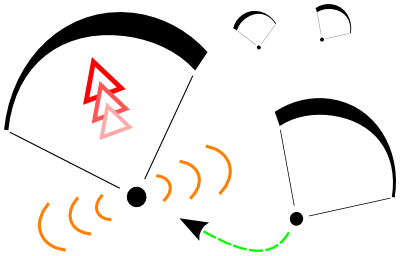SkyNet – Communicating Paragliders

Project Description
Foot-launched gliders rely on thermal columns in order to stay in the air. Unfortunately, it can be a very difficult task for a pilot to find these invisible thermals as accurate off-line computation and prediction of air flows is nearly impossible. We therefore propose to wirelessly interconnect hang and paragliders to form a Flying Ad-Hoc Network (FANET). This network enables pilots to collect and exchange live air flow information based on measured vertical climbing rates. The project is in an early stage. Additional informtaion will be available soon.
Project Period
- 2013-03-01 – 2016-07-31
Project Members
Dr.-Ing. Jürgen Eckert
Dr.-Ing. David Eckhoff
Prof. Dr.-Ing. Reinhard German
Related Publications
- Jürgen Eckert, Christoph Sommer und David Eckhoff, “Towards a Simulation Framework for Paraglider Networks,” 17th ACM International Symposium on Modeling, Analysis and Simulation of Wireless and Mobile Systems (MSWiM 2014), Poster Session, Montreal, Canada, pp. 49-52, September 2014

- Jürgen Eckert, Christoph Sommer und David Eckhoff, “A Validated Simulation Model for Communicating Paragliders,” 13. GI/ITG KuVS Fachgespräch Drahtlose Sensornetze (FGSN 2014), Potsdam, Germany, September 2014
- Jürgen Eckert, David Eckhoff und Reinhard German, “A Deterministic Radio Propagation Model for Inter-Paraglider Communication,” 11th IEEE/IFIP Conference on Wireless On demand Network Systems and Services (WONS 2014), Obergurgl, Austria, pp. 138-142, April 2014

- Jürgen Eckert, David Eckhoff und Reinhard German, “Flying Ad-Hoc Network Communication for Detecting Thermals: Feasibility and Insights,” 3rd International Conference on Innovative Computing Technology (INTECH 2013), London, UK, pp. 333-338, August 2013
